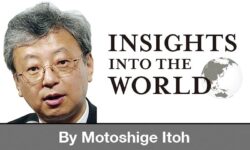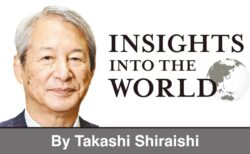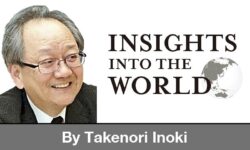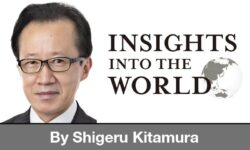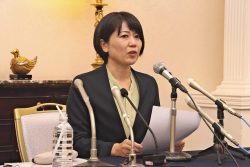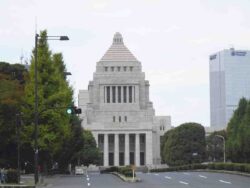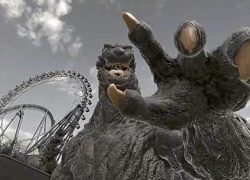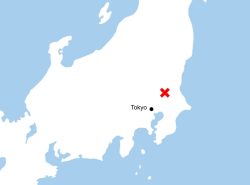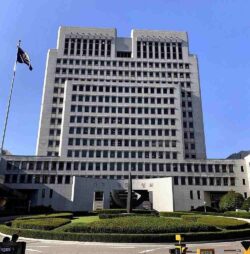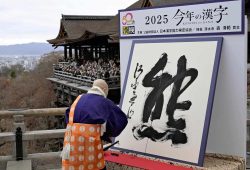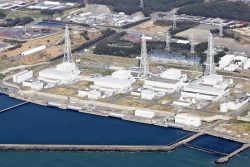10:00 JST, July 28, 2023
Prime Minister Fumio Kishida participated in the North Atlantic Treaty Organization’s summit on July 12, the second and last day of the alliance’s annual event, in the Lithuanian capital of Vilnius. He and the leaders from NATO’s three other Asia-Pacific partners Australia, New Zealand and South Korea, which form the so-called AP4 with Japan, participated in a meeting the same day with NATO Secretary General Jens Stoltenberg.
On the sidelines of the NATO summit, Kishida joined the other leaders of the Group of Seven major democracies — all of whom were in Vilnius as NATO members — to issue a joint declaration establishing a new framework for long-term security assurances for Ukraine. The G7 leaders thus demonstrated how closely they would be cooperating with and supporting Ukraine, on the heels of their renewed pledge to help Ukraine during May’s G7 summit in Hiroshima.
One major power has not taken part in any of these summits: China. In the joint communique issued by NATO leaders participating in the Vilnius summit, the analysis of China is that it has been challenging the transatlantic alliance’s interests and values.
China’s cyber-attacks and actions in domains beyond the geographic spectrum are serious threats to NATO, the alliance’s leaders noted. As for Russia’s invasion of Ukraine, Beijing has also refrained from criticizing Moscow thus far, a stance that is far different from that of the G7.
As we retrace the history of the 20th century, what we have recently been witnessing is a new development. Eighty years ago in 1943, Chiang Kai-shek, then head of the Nationalist government of China, which at the time was ruled by the Republic of China, held talks in Cairo with then U.S. President Franklin D. Roosevelt and then British Prime Minister Winston Churchill. The trio issued the so-called Cairo Declaration, spelling out a framework that outlined a post-World War II order in East Asia. This means that China was one of the parties involved in the shaping of the postwar order in East Asia from the very beginning.
Even after the Chinese Communist Party came to power, Beijing often cited the Cairo Declaration to argue that it was the People’s Republic of China that was qualified to take leadership in building a new postwar order in East Asia.
Beijing has contended that, despite the absence of any actual historical materials that would validate its claims, the Senkaku Islands in Okinawa Prefecture are part of its territory based on the Cairo Declaration and has unilaterally demanded that the status quo be changed in its favor.
China harming own image
China’s rhetoric for demanding a unilateral change in the status quo regarding the Senkakus on the basis of its own strategic interests has much in common with Russia’s armed annexation of Crimea in 2014. In the Vilnius communique, NATO said:
“The People’s Republic of China’s (PRC) stated ambitions and coercive policies challenge our interests, security and values.
“The Indo-Pacific is important for NATO, given that developments in that region can directly affect Euro-Atlantic security.”
The transatlantic alliance has thus clarified that China’s hegemonic actions are a threat to it.
During the Vilnius summit, Kishida took advantage of the opportunity to speak to the leaders of the NATO member countries, saying, “The security of the Euro-Atlantic and Indo-Pacific are inseparable, and it is widely shared that the aggression against Ukraine is not only a European issue, but a global one.”
Japan assumed its monthlong presidency of the U.N. Security Council in January this year, then hosted the G7 summit in Hiroshima in May with Kishida presiding. In July, Kishida participated in the abovementioned NATO summit in Vilnius, announcing an important Japan-NATO agreement on the Individually Tailored Partnership Program.
All these developments can be said to have resulted from the permeation of Japan’s diplomatic messages aimed at upholding “the free and open international order based on the rule of law,” which is essential to rebuild the world order that has been wavering owing to the war in Ukraine.
In contrast, China, for its part, has considerably harmed its image as a major power responsible for assuming a leadership role in the international community, as it has chosen to go along with Russia, the invader of Ukraine, and to refrain from denouncing Moscow.
China’s trade with and investment in the so-called Global South amount to enormous sums. As the Global South countries now have an increasing presence, many of them presumably find it beneficial to stay on good terms with China.
Nonetheless, it should be recognized that there has been a major setback in international confidence in China, a prerequisite for Beijing to assume a leadership role in the global community.
Diplomacy facing scrutiny
Two international conferences scheduled later this year will certainly draw global attention. In September, India will host an annual summit of the Group of 20 key economies in New Delhi. In November, the United States will chair the Asia-Pacific Economic Cooperation Leaders’ Meeting in San Francisco. Chinese and Russian leaders are expected to take part in both annual G20 and APEC events.
It is relatively easy for conferences held by G7 or NATO to reach agreement, as the participants are exclusively liberal democracies that share common values. On the flip side, given the division and structural confrontation between liberal democratic and authoritarian systems, it is not easy for the G20 or APEC conferences, in which countries of both camps assemble, to work out an agreement. As a result, India and the United States are being put to the test in their roles as host and coordinator.
Russia’s invasion of Ukraine is likely to turn into a protracted war. In the meantime, the leadership of Xi Jinping, who has entered his third term as China’s president, is intensifying its confrontational posture toward Western nations.
With more than one year having passed since Russian troops invaded Ukraine in February 2022, the war has revealed that the international community has been divided to such an unprecedented extent that international cooperation is now extremely difficult to achieve. Against such a backdrop, the necessity to reinforce military capabilities is growing more than ever before.
This point was clearly emphasized in the three national security and defense documents the Japanese government adopted in December last year: the National Security Strategy, the National Defense Strategy and the Defense Buildup Program. Though Japan is facing fiscal hitches, the Kishida administration is correct in its judgment that it will have to squarely tackle the issue of increasing Japan’s defense spending.
However, Japan should not stop there. Instead, as a peace-loving country, it should assume a more proactive role in contributing to remedying the rifts and divisions in the international community. In other words, the true value of Japan’s diplomacy is now subject to scrutiny.
In the preface to the Diplomatic Bluebook 2023, the latest annual report on Japan’s foreign policies and diplomatic activities, Foreign Minister Yoshimasa Hayashi said, “The world is now at a turning point in history.” Showing a sense of crisis, he added, “The free and open international order based on the rule of law, which supported peace and prosperity in the post-Cold War era, is facing serious challenges due to historical changes in the balance of power and intensifying geopolitical competition.” Hayashi well understands the current state of international affairs.
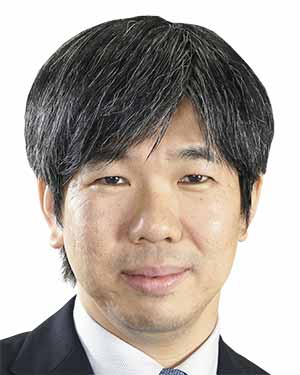
Yuichi Hosoya
Yuichi Hosoya is a professor of international politics at Keio University and the author of numerous books on British, European and Japanese politics and foreign affairs, including “Security Politics in Japan: Legislation for a New Security Environment,” and he is the coeditor of “Modern Japan’s Place in World History: From Meiji to Reiwa.”
The original article in Japanese appeared in the July 23 issue of The Yomiuri Shimbun.
"Editorial & Columns" POPULAR ARTICLE
-

Violations of Subcontract Law: Major Automakers Must Eliminate Old Practices
-

Local Governments’ Tax Revenues: Devise Ways to Correct Imbalances in Tax Sources
-

Heavy Rains in Asia: Support for Victims, Flood-Control Measures Urgently Needed
-
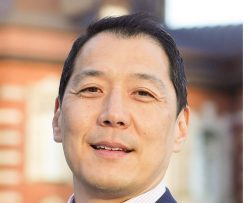
5 Japanese Business Dinner Mistakes to Avoid — and What They Taught Me About Business in Japan
-

New Nuclear Threat: China Seeking to Follow U.S., Russia in Military Expansion
JN ACCESS RANKING
-
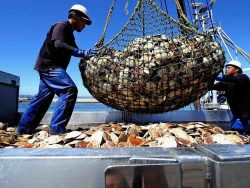
Japan’s Hopes for Seafood Exports Shot Down in China Spat
-

Keidanren Chairman Yoshinobu Tsutsui Visits Kashiwazaki-Kariwa Nuclear Power Plant; Inspects New Emergency Safety System
-
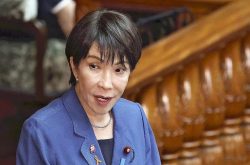
Japan to Charge Foreigners More for Residence Permits, Looking to Align with Western Countries
-

Imports of Rare Earths from China Facing Delays, May Be Caused by Deterioration of Japan-China Relations
-
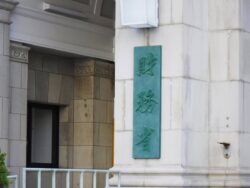
Japan Exports Rise in October as Slump in U.S. Sales Eases


